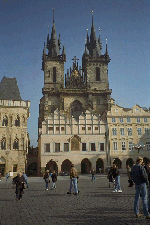
Weekend Edition Producer and Host Sharon Basco and Producer Dean Cappello travelled to four great cultural centers of Eastern Europe -- Berlin, Budapest, Prague, and Warsaw -- to see how artists, musicians, and writers are coping during this post-communist and post-Berlin Wall period.
The report was produced by Monitor Radio and originally broadcast in March of 1994. Rebroadcast of Monitor Radio is made possible by the Internet Multicasting Service and our sponsors.
![[audio]](/images/speaker.gif) .au format (7.5 Mb),
.gsm format ( Mb),
.ra format (0.9Mb).
.au format (7.5 Mb),
.gsm format ( Mb),
.ra format (0.9Mb).
The Berlin Wall came down in November of 1989, heralding the start of a new era. Monitor Radio visits the Berlin State opera, the Deutsches Theater, and the Berlin Philharmonic to talk with musicians, actors, and managers who are learning to adjust to the world after socialist funding.
![[audio]](/images/speaker.gif) .au format (2.1 Mb),
.gsm format ( Mb),
.ra format (0.2 Mb).
.au format (2.1 Mb),
.gsm format ( Mb),
.ra format (0.2 Mb).
Prague, the capital of the Czech Republic is a new international magnet; it has eclipsed Paris as the favorite tourist destination in the world. Today, with the generous arts funding of the Communist decades a thing of the past, artists are in a state of transition and their institutions grapple with the new pressures of commercialism.
![[audio]](/images/speaker.gif) .au format (9.1 Mb),
.gsm format ( Mb),
.ra format (1.1 Mb).
.au format (9.1 Mb),
.gsm format ( Mb),
.ra format (1.1 Mb).
Monitor Radio's trip to Budapest begins with Budapest's High School of Dance and director Imre Dozsa, who talks about the difference in audiences and arts training after the Soviet era. The program also visits the Hungarian Dance Ensemble and the newly restored Hungarian State Opera House. The tour of Budapest concludes with a visit to the Deputy State Secretary for the Ministry of Culture to explore how Hungary looks to its children as the foundation of its cultural future.
![[audio]](/images/speaker.gif) .au format (8 Mb),
.gsm format ( Mb),
.ra format (1 Mb).
.au format (8 Mb),
.gsm format ( Mb),
.ra format (1 Mb).
The bond between the Polish people, their culture, and the arts is historically strong. In Poland, the role of the artist is no mere occupation; it's a social, political, and moral mission. Monitor Radio explores the ways that Polish artists of every kind have had to define a new role for themselves, a new context for their work, and even a new message to present through their work.
![[audio]](/images/speaker.gif) .au format (6.8 Mb),
.gsm format ( Mb),
.ra format (0.8 Mb).
.au format (6.8 Mb),
.gsm format ( Mb),
.ra format (0.8 Mb).
Jiri Suchy could well be described as the premier Renaissance man of Eastern Europe. As a composer, singer, poet, and theater director, Suchy was persona non grata in Czechoslovakia during the years of Soviet domination. In his conversation with Sharon Basco, he reflects on his work and on the changing political climate that molded his career.